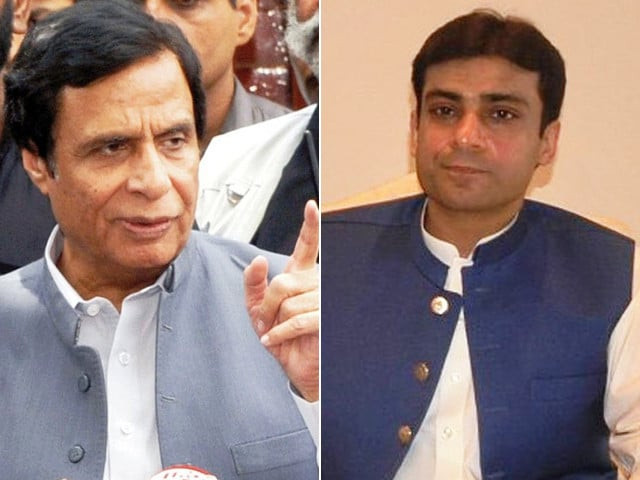Punjab PA to elect new CM today
LHC dismisses Speaker Elahi’s appeal, allows Deputy Speaker Mazari to conduct contest

The Punjab Assembly is all set to conduct the provincial chief minister’s election today (Saturday) as the Lahore High Court dismissed an intra-court appeal of Pakistan Muslim League-Quaid leader Chaudhry Pervaiz Elahi, seeking a member of the panel of chairpersons to preside over the election instead of Deputy Speaker Sardar Dost Muhammad Mazari.
A division bench, headed by Justice Shujaat Ali Khan and comprising Justice Jawad Hassan, upheld LHC Chief Justice Muhammad Ameer Bhatti’s order allowing Deputy Speaker Mazari to conduct the election for the chief minister scheduled for April 16 (today).
It was the second time that Punjab Assembly Speaker Elahi and the assembly secretariat lost a legal battle against Deputy Speaker Mazari.
Earlier, Chief Justice Bhatti had ordered Mazari to preside over the session for the CM’s election under sub-article (3) of Article 130 of the Constitution. The order was passed on Mazari’s petition against Speaker Elahi, who according to him, had withdrawn his powers as an acting speaker.
As CJ Bhatti’s order came, Speaker Elahi and the assembly secretariat challenged the decision. This time, the LHC division bench heard the matter in detail.
As the proceedings commenced on Friday, Justice Shujaat directed the Punjab inspector general of police (IGP), who was present in the court room, to revise the SOP and ensure complete security during the election for the CM and that no members of the assembly would be restrained from entering the assembly premises. Justice Shujaat also directed the Punjab chief secretary to coordinate with the IGP in order to ensure a smooth election process.
The arguments of counsels of Elahi and the secretariat revolved around “biasedness”, as they believed that the role of deputy speaker had become “controversial”.
At the start of arguments, Justice Shujaat asked the deputy speaker to explain the actual picture of what actually happened.
Mazari apprised the bench of how his powers were withdrawn and how the assembly was made a no-go area. “We have not seen such a picture which the assembly presented on April 6 even in the dictatorship era.” He said he had issued a notification of April 6 following the advocate general of Punjab’s statement in the Supreme Court.
The bench asked Advocate General Ahmad Awais, who denied giving any such statement before the SC. He implored the court that he had just described the factual position in the SC and had not given any undertaking that the election would be conducted on April 6.
Justice Hassan while reading Clause (3) of Article 53 of the Constitution said the case revolved around a line “unable to perform his functions due to any cause”.
Justice Hassan asked the PML-Q’s counsels what the “cause” was.
They argued that the cause was that Speaker Elahi was contesting for the CM’s post.
To another query of Justice Jawad that what “cause” were they attributing to Deputy Speaker Mazari, they said his role had become controversial. They added that the rules were very clear for that person who lost confidence of majority members. “Ultimately, the house will be presided over by the top person among the panel of chairpersons which is announced by the speaker during the first sitting of the session.”
Barrister Ali Zafar presented four points, which according to him, made Deputy Speaker Mazari’s role controversial. First, a no-trust motion was submitted against him; secondly, Mazari had become a party in litigation as he levelled allegations against a candidate, Speaker Elahi, before the election; thirdly, the PML-N lawyers were arguing in support of Mazari; and fourthly, Mazari had disclosed his mind on TV programmes.
On Justice Jawad’s queries as to how they could judge a person’s biasness, what was its criteria and how could it affect the things, the secretariat’s counsel argued that biasness did not mean that that person was biased, adding that biasness was that when others started to feel someone tilting towards a specific side.
He argued that they feared that Deputy Speaker Mazari could give benefit to others in the CM’s election.
Mazari’s counsel asked that did it make any sense that the opposite side’s counsels were claiming that Mazari had become a party in the legal battle although he just knocked the doors of the court to obtain justice. He argued that Clause (3) of Article 53 of the Constitution was very clear. Neither his client was absent nor was he unable to perform his function nor any cause the opposite side had developed following which a conclusion could be drawn that the deputy speaker could not chair the house.
However, the bench after hearing detailed arguments first reserved and then announced the judgment.
The Punjab Assembly is all set to conduct the provincial chief minister’s election today (Saturday) as the Lahore High Court dismissed an intra-court appeal of Pakistan Muslim League-Quaid leader Chaudhry Pervaiz Elahi, seeking a member of the panel of chairpersons to preside over the election instead of Deputy Speaker Sardar Dost Muhammad Mazari.
A division bench, headed by Justice Shujaat Ali Khan and comprising Justice Jawad Hassan, upheld LHC Chief Justice Muhammad Ameer Bhatti’s order allowing Deputy Speaker Mazari to conduct the election for the chief minister scheduled for April 16 (today).
Read More: Nisar to take oath as member Punjab Assembly tomorrow
It was the second time that Punjab Assembly Speaker Elahi and the assembly secretariat lost a legal battle against Deputy Speaker Mazari.
Earlier, Chief Justice Bhatti had ordered Mazari to preside over the session for the CM’s election under sub-article (3) of Article 130 of the Constitution. The order was passed on Mazari’s petition against Speaker Elahi, who according to him, had withdrawn his powers as an acting speaker.
As CJ Bhatti’s order came, Speaker Elahi and the assembly secretariat challenged the decision. This time, the LHC division bench heard the matter in detail.
As the proceedings commenced on Friday, Justice Shujaat directed the Punjab inspector general of police (IGP), who was present in the court room, to revise the SOP and ensure complete security during the election for the CM and that no members of the assembly would be restrained from entering the assembly premises. Justice Shujaat also directed the Punjab chief secretary to coordinate with the IGP in order to ensure a smooth election process.
The arguments of counsels of Elahi and the secretariat revolved around “biasedness”, as they believed that the role of deputy speaker had become “controversial”.
At the start of arguments, Justice Shujaat asked the deputy speaker to explain the actual picture of what actually happened.
Mazari apprised the bench of how his powers were withdrawn and how the assembly was made a no-go area. “We have not seen such a picture which the assembly presented on April 6 even in the dictatorship era.” He said he had issued a notification of April 6 following the advocate general of Punjab’s statement in the Supreme Court.
The bench asked Advocate General Ahmad Awais, who denied giving any such statement before the SC. He implored the court that he had just described the factual position in the SC and had not given any undertaking that the election would be conducted on April 6.
Justice Hassan while reading Clause (3) of Article 53 of the Constitution said the case revolved around a line “unable to perform his functions due to any cause”.
Justice Hassan asked the PML-Q’s counsels what the “cause” was.
They argued that the cause was that Speaker Elahi was contesting for the CM’s post.
To another query of Justice Jawad that what “cause” were they attributing to Deputy Speaker Mazari, they said his role had become controversial. They added that the rules were very clear for that person who lost confidence of majority members. “Ultimately, the house will be presided over by the top person among the panel of chairpersons which is announced by the speaker during the first sitting of the session.”
Barrister Ali Zafar presented four points, which according to him, made Deputy Speaker Mazari’s role controversial. First, a no-trust motion was submitted against him; secondly, Mazari had become a party in litigation as he levelled allegations against a candidate, Speaker Elahi, before the election; thirdly, the PML-N lawyers were arguing in support of Mazari; and fourthly, Mazari had disclosed his mind on TV programmes.
On Justice Jawad’s queries as to how they could judge a person’s biasness, what was its criteria and how could it affect the things, the secretariat’s counsel argued that biasness did not mean that that person was biased, adding that biasness was that when others started to feel someone tilting towards a specific side.
He argued that they feared that Deputy Speaker Mazari could give benefit to others in the CM’s election.
Mazari’s counsel asked that did it make any sense that the opposite side’s counsels were claiming that Mazari had become a party in the legal battle although he just knocked the doors of the court to obtain justice. He argued that Clause (3) of Article 53 of the Constitution was very clear. Neither his client was absent nor was he unable to perform his function nor any cause the opposite side had developed following which a conclusion could be drawn that the deputy speaker could not chair the house.
However, the bench after hearing detailed arguments first reserved and then announced the judgment.



















COMMENTS
Comments are moderated and generally will be posted if they are on-topic and not abusive.
For more information, please see our Comments FAQ